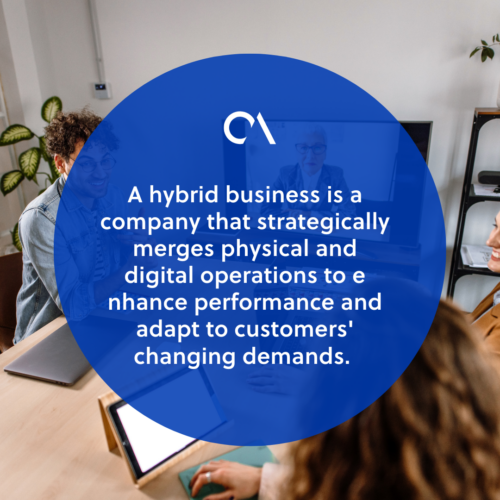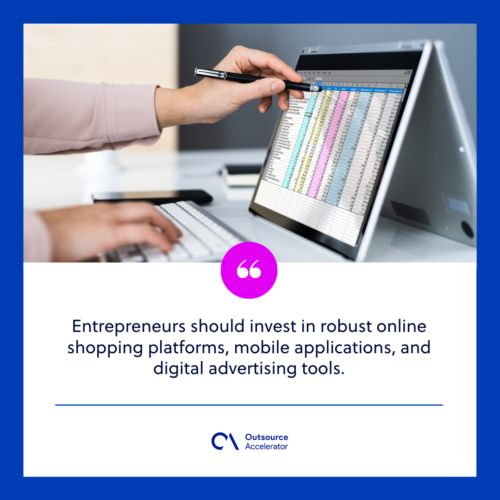Exploring a hybrid business model

To achieve business success, companies must embrace new ideas, such as the integration of traditional and digital strategies.
Most businesses today operate with physical stores or offices, yet they often lack the digital presence that comes with e-commerce websites and social media platforms. From this point, the concept of a hybrid business model emerged.
What is a hybrid business?
A hybrid business is a company that strategically merges physical and digital operations to enhance performance and adapt to customers’ changing demands.
In contrast to businesses solely reliant on traditional establishments or those operating exclusively online, a hybrid business seamlessly combines the advantages of both approaches.
Hybrid businesses are a blend of physical and digital presence. They operate through physical stores or offices while also harnessing the potential of e-commerce websites and social media platforms.
This strategic balance enables them to effectively cater to customer needs, optimize operations, and gain a competitive edge in the market.

Advantages of a hybrid business model
Operating both physical and digital, companies have gained advantages from adopting a hybrid business approach.
Some of the benefits of employing a hybrid business strategy are:
Increased revenue generation
Companies can enhance their sales revenue by employing physical and digital channels. This strategic approach enables them to expand their customer base, reaching a broader audience, and explore untapped markets.
Transitioning to cost efficiency
The benefit of a hybrid business also includes cost efficiency.
When businesses operate online, they can experience an increase in sales without the need for a physical storefront. This valuable advantage enables owners to save costs on rent, utilities, and maintenance expenses.
Moreover, incorporating hybrid business practices can significantly improve inventory management and streamline the supply chain.
Companies have the opportunity to optimize their procurement processes, alleviate excess inventory or shortages, and enhance inventory turnover rates.
Expanding reach and customer base
Physical stores offer a personalized experience, enabling customers to engage with products and receive immediate assistance.
At the same time, maintaining an online presence has the potential to draw more visitors toward physical stores. By coming across products or services online, individuals may be inclined to visit a store in person for a firsthand encounter.
Digital platforms also empower businesses to establish global connections with customers around the clock.
Flexibility and adaptability
The hybrid business model provides the necessary adaptability and versatility for achieving success in today’s dynamic business landscape. It empowers companies to swiftly respond to changing market trends and evolving customer preferences.
Businesses can effectively explore new products or services by operating physical stores and online platforms. This allows them to test these offerings in their traditional locations while simultaneously collecting valuable feedback from their online audience.
For instance, companies that adopt a hybrid business model are better equipped to navigate unexpected events and challenges, such as natural disasters or pandemics. This approach enables them to handle alterations swiftly and efficiently.
When physical stores must temporarily close, establishing an online presence for your business becomes crucial in sustaining profits.
Increased brand visibility and recognition
Operating across various channels enables companies to connect with a wider range of potential customers and boost brand recognition.
With a strong online presence alongside a physical store, businesses provide customers with a complete brand immersion, cultivating stronger brand loyalty.
Strategies for implementing a hybrid business model
To attain success in a hybrid business model, careful planning and efficient execution are vital. Here are three crucial strategies to bear in mind:
Integrating physical and digital operations
Integrating physical and digital activities is crucial in establishing a successful hybrid business model.
To ensure a smooth and cohesive customer experience, it is essential to create a seamless integration across various channels.
For example, companies provide the convenience of online ordering and in-store pickup, ensuring a seamless and satisfying experience for customers. This ultimately leads to increased customer satisfaction.
Leveraging technology
Entrepreneurs should invest in robust online shopping platforms, mobile applications, and digital advertising tools. These resources can significantly enhance their business operations and reach a wider audience.
In utilizing customer relationship management (CRM) systems, owners can effectively gather and evaluate customer data.

Data-driven decision making
Companies gain valuable insights into customer actions, inclinations, and purchasing trends by gathering and analyzing customer data from various channels. This comprehensive understanding enhances their ability to make informed decisions.
This knowledge enables owners to refine their business practices, leading to increased customer satisfaction and optimal financial success.
Why businesses switch to hybrid business strategies
Business owners should consider adopting hybrid business strategies for the numerous advantages and opportunities they offer.
They can effectively address customer demands and maintain competitiveness by blending traditional and modern approaches.
By merging physical and digital operations, brands uncover fresh revenue ideas and decrease expenses while reaching a wider range of customers.
Embracing a hybrid business model can revolutionize how businesses function, flourish, and respond to ever-changing market dynamics.
By skillfully implementing strategies integrating physical and digital operations, businesses can position themselves for success in today’s fiercely competitive business landscape.







 Independent
Independent




